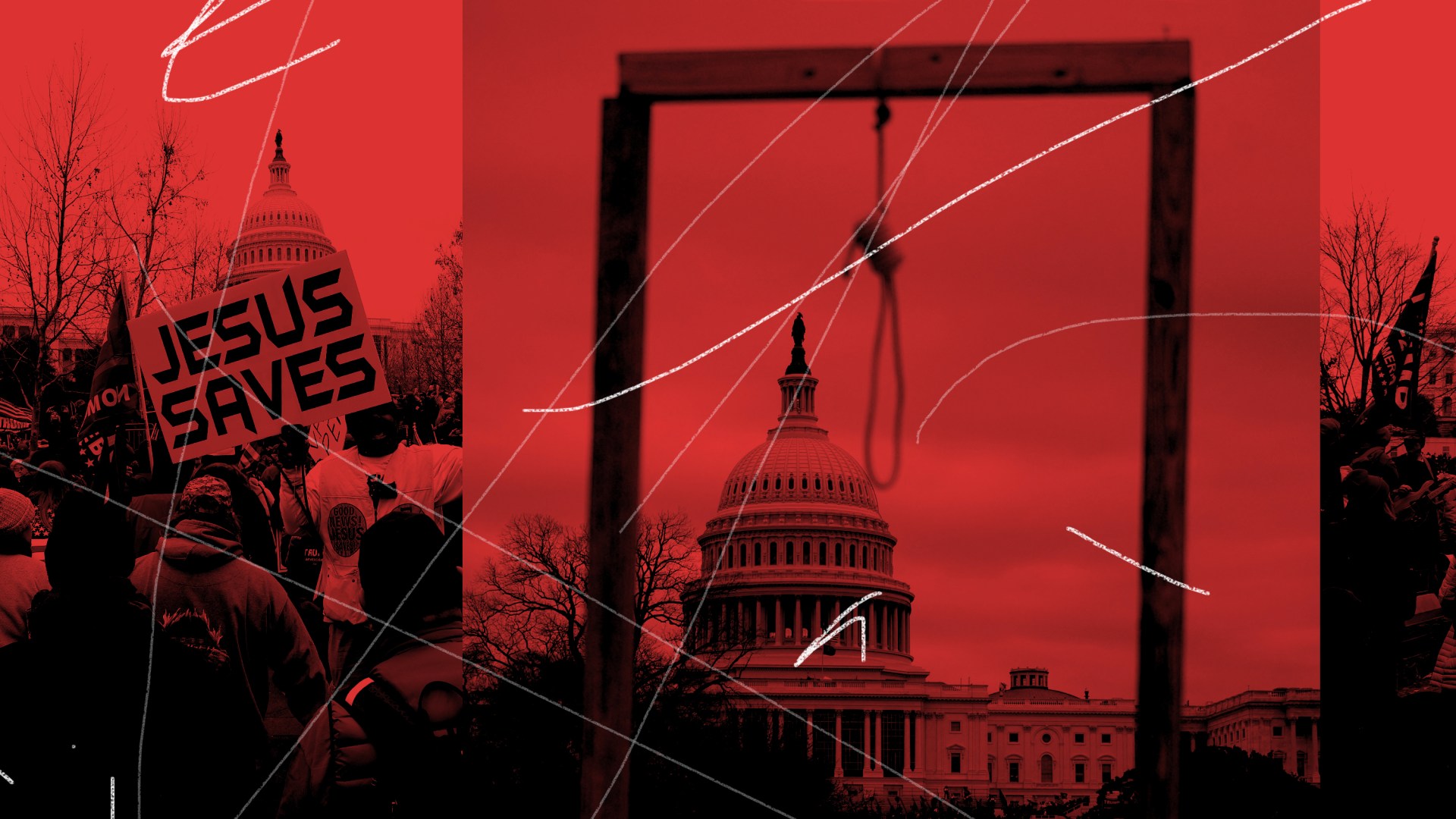A year has passed since the January 6 insurrectionist attack on the United States Capitol, and two images still haunt my mind. One is that of a makeshift gallows constructed to threaten the murder of the vice president of the United States. And the other is that of a sign, held above that angry crowd, that read, “Jesus Saves.” That these two images can coexist in the same mob is a sign of crisis for American evangelicalism.
Some might dismiss the Christian symbols at the insurrection—not only signs but prayers “in Jesus’ name” right next to a horn-wearing shaman in the well of the evacuated US Senate. And some might wave away the evangelicals who falsely claimed in the days afterward that it had been a crowd of antifa activists, not people from the rally at which the then–President of the United States incited the mob to march to the Capitol.
And yet, survey after survey shows that alarming numbers of white evangelicals believe the lie behind the attack—that the 2020 election had been stolen by a vast left-wing conspiracy that somehow included the conservative Republican governors and election officials in Georgia and Arizona.
An evangelical megachurch hosted former President Trump in recent days—with the crowd chanting “USA!” in response to the former president’s political speech. That scene might be a little too on the nose for most evangelicals, but the polling data show that it is not an aberration. And the same surveys show that, far from “cooling off” after the Trump era and the insurrection, these people believe that violence might be justified in the days to come.
In some ways, what we have seen in the year since the insurrection represents a change. Note the increasing numbers of people who identify as “evangelical”—many of whom don’t even attend church—because they assume that this is the religious designation for their political movement.
But, maybe in even more disturbing ways, these trends represent what hasn’t changed at all.
In the days leading up to the insurrection, some evangelical Christians gathered on the National Mall for a “Jericho March,” repeating the same falsehoods—that the election had been stolen and therefore should be overturned. This type of assertion that, as Trump put it, “If you don’t fight … you won’t have a country anymore,” is hardly new for large sectors of American evangelicalism.
Some have sold literal or metaphorical bunker supplies for the imminent collapse of civilization sure to come because of Y2K or sharia law or the Supreme Court’s Obergefell decision or critical race theory or a plot to shutter churches permanently due to the pandemic, or whatever. Many sectors of evangelicalism have become apocalyptic about everything but the actual Apocalypse.
As with the insurrection (and virtually every authoritarian movement in history), an apocalyptic moment is an emergency requiring emergency measures. Thus we get the cognitive dissonance of people who support law and order (sometimes by quoting Romans 13) beating police officers and breaking through windows in order to shut down Congress’s constitutional duty to count electoral votes. These are the people who can ridicule the very words of Jesus Christ about turning the other cheek as naïve and weak.
This kind of emergency, we’re told, can’t worry about constitutional norms or about Christian character. The reasoning goes that the Sermon on the Mount isn’t a suicide pact and the way of Jesus only works with enemies more reasonable than these, like, I suppose, the Roman empire that crucified the one who gave us such teaching.
Such is the sign not of a post-Christian culture but of a post-Christian Christianity, not of a secularizing society but of a paganizing church.
It would be one thing if this were just a matter of the crowd attacking the Capitol that day. It’s quite another when people—including people with highlights in their Bibles and prayer requests on their refrigerators—wave the attack away as a mere protest from which we should “move on.” This represents more than a threat to American democracy—though that would be bad enough—but a threat to the witness of the church.
One cannot carry Good News to people you might, if things get bad enough, have to beat up or kill. One cannot bring about good by doing evil. One cannot “stand for truth” by employing lies.
Maybe January 6 was a terrible anomaly in our history, one that will never repeat. I hope so. Or maybe January 6 is, as The Atlantic put it, “practice” for even more coup attempts and mob violence to come. I don’t know. Either way, I know this: We as American evangelicals cannot justify what happened at the Capitol a year ago. We can’t ignore it either. If Jesus is the one who saves, then we must go his direction—and that’s toward mission, not resentment, toward gospel and not rage.
And that means we must choose between the way of the gallows and the way of the Cross.
Russell Moore leads the Public Theology Project at Christianity Today.









